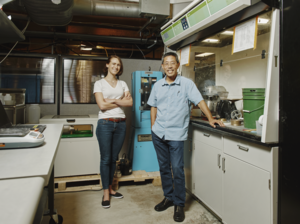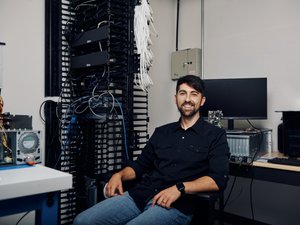Tablets are taking over the country's classrooms. Mitch Rosenberg and Marina Umaschi Bers are proposing an alternative, however. One that doesn't involve chaining students to a screen.
The duo, with more than 50 years of technology experience between them, have co-founded KinderLab Robotics, a company creating toys and educational tools designed to get children excited early about science, technology, engineering and math. Their first product is called KIBO, and has banked more than $61,000 on Kickstarter with just over a week left of fundraising to go.
"It's so damn necessary," said Rosenberg, when initially asked why he helped launch the company. "We're living in a world where every person will be called upon to think like a programmer."
Rosenberg previously worked as the VP of marketing and product management for both Kiva Systems, which was acquired by Amazon for $775 million in early 2012, and Rethink Robotics. He met Umaschi Bers at a birthday party for one of their sons, and was fascinated by the research she was doing at Tufts University's Eliot-Pearson Department of Child Development, where she serves as the director of the DevTech research group.
"The research was really based on what children can learn and what the best tools are for children to learn with," Umaschi Bers said. "You don't want them in front of the screen the whole time. You want them playing around. You want them using their senses."
KIBO is intended for four- to seven-year-old children. The robot kit features "manipulative" wooden blocks that each represent a different action for the robot.
"To learn how to program and code, you need to have a programming language," Umaschi Bers said. "Our programming language is building blocks."
KIBO features sensors that work with the wooden programming blocks to detect light, sound and distance. After building the program, children scan the sequence of blocks with the robot body, then press a single button to start KIBO.
"The product is not finished without the children's creativity and imagination."
"It's a full programming language for young kids that doesn't require a screen," Umaschi Bers said, adding that children can attach all the lights, bulbs and sensors themselves, or add their own recyclables. "The product is not finished without the children's creativity and imagination."
KIBO comes with art platforms that allow users to decorate and personalize their robot — a feature Rosenberg notes differentiates the product from others available. "Other robots already have a face and personality before you even buy them and take them out of the plastic," he said.
KIBO's prototype has been tested by more than 300 students, ranging in age from Pre-K to second grade, and 35 teachers. The feedback, evidenced by the clear Kickstarter success, has been positive. Teachers have said KIBO engages students' creative and technical side. The kit symbolizes "a unified whole rather than separate silos of understanding and knowledge," according to Rosenberg, which thereby results in more well-rounded children.
The co-founders have also heard that KIBO could be beneficial for children with learning disabilities, as they're able to break down problems into small components.
"It's really important to our personal mission that all kids have this sort of literacy," Rosenberg explained. "We really believe in the power of face-to-face learning … face-to-face with your co-collaborators and face-to-face with your teachers and parents."
Rosenberg and Umaschi Bers want to see a KIBO in every classroom, a goal they'll more easily be able to achieve if they hit their stretch goals. "If we reach $80,000 by June 29, we will start a fund for schools that need help affording their KIBOs," wrote the duo on their Kickstarter.
KIBO will be assembled in Arlington, Mass., and, as time goes on, the team will develop different ways students can interact with their robot. KinderLab Robotics will also consider expanding beyond the classroom and reaching students attending after-school programs and summer camps.
"You can teach a technology subject in an active and dynamic way," Rosenberg said.
To see that for yourself, check out the team's Kickstarter video below.








